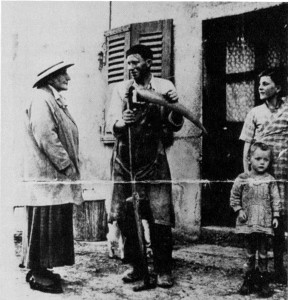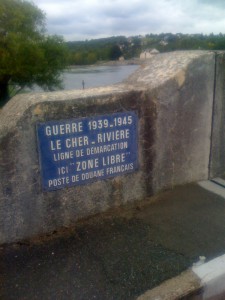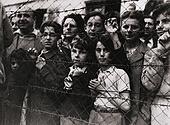Gertrude Stein a “Collaborator“, a „Nazi“?
Questions abound. Suddenly everyone asks about Gertrude Stein’s whereabouts during WW2. How come she stayed in France when France was Nazi-occupied? Why didn’t she leave? Why didn’t she and Alice get the treatment of enemy aliens (i.e. Americans) like Sylvia Beach of Shakespeare & Company, who got rounded up in Paris and taken to the Vittel detention camp? Why didn’t they get deported like other Jews, other lesbians, other unwanted people? Were they protected somehow and for some reason? Was their collection of “degenerate” art, all those pictures by Picasso, Matisse, Cézanne, left behind in their apartment in Paris, protected too?
The same questions were raised many times before in Stein biographies. A few years ago they were raised loudly by Janet Malcolm’s Two Lives: Gertrude and Alice, and the answer has always been the same: Stein’s close friend and frequent visitor, Bernard Faÿ, who turned collaborator during the war, allegedly protected them. When Malcolm’s book came out in 2004, nobody cared.
Suddenly this is not good enough. An urgent, belligerent need to question Stein started with criticism of the exhibition Seeing Gertrude Stein and with a few loud-enough voices accusing the curators at the Contemporary Jewish Museum of hiding facts and protecting Stein’s image by not properly addressing her war survival. (It doesn’t seem to matter that the catalog addresses the war chapter at some length.)
Suddenly there is great concern from certain academic corners. A new book – Barbara Will’s Unlikely Collaboration: Gertrude Stein, Bernard Fay and the Vichy Dilemma – tries to place Stein under an x-ray examination that makes her look guilty before tried (She is not invited to defend herself.) At a museum panel, local historian Fred Rosenbaum gets “extremely worried” about Stein. Visitors and bloggers who have never before read or studied Stein are enraged by certain details they snap up from the agitation around them: What? Stein had a Nazi friend? Stein said Hitler ought to get the Nobel Peace Prize? How scandalous! Stein a collaborator! Worse, Stein, a Nazi!
As I said before in my blog, Jewish humor is lost even on Jewish commentators when Stein, in an interview with NY Times Magazine in 1934, recommends Hitler for the Nobel Peace Prize, just as Freud, in my argument, “recommended” the Gestapo with the same perfect irony. People don’t bother to look at the interview by Lansing Warren even though it can be found online, and don’t note that the interviewer points to the laugh and “impish” look on Stein’s face as she brings out this outrageous proposition. Isn’t this the way Jewish humor works?
The “fact” that makes people most hysterical, is that Stein made an attempt to translate Pétain’s speeches. Pétain was every French person’s hero after Verdun, and he was Stein’s and most French people’s hero again when he saved Paris and most of France from the total destruction that had just been witnessed wherever the Nazi war machine had crossed a border. French people had seen the refugees running from Belgium. “…grandmothers holding dead babies in their arms, women with parts of their faces shot away, and insane women who had lost their children, their husbands, and all reasons for living.” (in Charles Glass, Americans in Paris: Life and Death under the Nazi Occupation, 2010) They had seen the beginning of the end when Orléans was destroyed by the Germans. Yes, Stein was a conservative to the point that would make her a perfect mid-line Republican today. She said it repeatedly in her 1939 portrait of the French, Paris France: “I cannot write too much upon how necessary it is to be completely conservative that is particularly traditional in order to be free. And so France is and was.”
So how can a radical avant-gardist at the same time be a traditionalist, a conservative, even perhaps reactionary? Just as well ask the question: how can a radical avant-gardist like Picasso turn communist after Stalin’s show trials, gulags and mass murders?
It’s like the voices accusing her of staying in occupied France are complaining that Stein didn’t have a crystal ball to foresee what would happen under the Vichy Régime that chose Pétain as their prime minister. Was she supposed to foresee that her friend Faÿ, who was highly respected as an academic and author in the States and had in many ways helped her career, would turn collaborator? That her stay in the Zone Libre, where American Jews lived freely, especially if they were over 65 years old, would be eliminated by Nazi Germany in Nov. 1942? That she and Alice would need special protection?
Friendship was the only thing in wartime that could make or break your life, and we know about Stein’s unusual talent for friendship. Friendship was much more important to her than politics. According to her, no serious writer could be interested in politics. Did you know that Slyvia Beach was rounded up in Paris in 1942 and deported to the Vittel detention camp, but set free in 1943, when her lover Adrienne Monnier turned to a friend with SS connections (a collaborator!) to save her? That the same SS sent her beloved assistant Francoise Bernheim to Auschwitz to die? Did you know that Sylvia Beach, who lived in Paris at the hub of international connections, did not hear about the death camps until Polish women at the camp opened her eyes? You begin to open your eyes to the complexities of the situation. When you know that two thirds of French Jews survived in France during the war, you begin to understand that Gertrude and Alice had reason to hope that staying in the country, among friends, with a vegetable garden, might be the best place to survive. Stein does not write about death camps, it is true, and isolated in the deep countryside for years, refusing to listen to the radio, one can only wonder if she got the news at all in Occupied France. She describes in detail what the first days and weeks of war were like in an article published in The Atlantic Monthly, in 1940: “The Winner Loses: A Picture of Occupied France.” She expresses the same feelings toward the Nazis that her French neighbors felt, deep fear and loathing and a profound sadness about France.
Yes, Gertrude and Alice were afraid. They got many warnings to leave. But how would they emigrate (to near-by Switzerland, as was suggested) without being able to take their beloved dog? How would they fare as an aging couple in a new place, among strangers?
“And then Italy came into the war and then I was scared, completely scared, and my stomach felt very weak, because – well, here we were right in everybody’s path any enemy that wanted to go anywhere might easily come here. I was frightened; I woke up completely upset. And I said to Alice Toklas, ‘Let’s go away.’”
They asked all their friends and neighbors: “’Well,’ said Doctor Chabout, reflecting. ‘I can’t guarantee you anything, but my advice is stay. I had friends,’ he said, ‘who in the last war stayed in their homes all through the German occupation, and they saved their homes and those who left lost theirs. No,’ he said, ‘I think unless your house is actually destroyed by a bombardment, I always think the best thing to do is to stay.’ He went on, ‘Everybody knows you here; everybody likes you; we all would help you in every way. Why risk yourself among strangers?”
“’Thank you,’ we said, ‘that is all we need. We stay.’’’ (“The Winner Loses”)
 Even protected and helped, anything and everything could have gone wrong. The Gestapo came twice to look at the degenerate art in their Paris home. Again it was friends, this time in Paris, among them Picasso and their neighbor friend, the painter Katherine Dudley (perhaps also Faÿ), who helped and took care of their apartment (by then in rue Christine) with all their art inside.
Even protected and helped, anything and everything could have gone wrong. The Gestapo came twice to look at the degenerate art in their Paris home. Again it was friends, this time in Paris, among them Picasso and their neighbor friend, the painter Katherine Dudley (perhaps also Faÿ), who helped and took care of their apartment (by then in rue Christine) with all their art inside.
In their second country house, in Culoz, Italian soldiers were billeted under their roof. Germans were milling in Bellay, their next-door town, and roaring on their motor-bikes through the village of Bilignin.
In Wars I Have Seen, Stein’s diary-like memoir of those years, Stein does not seem to have any sense of being protected; she has a sense of pervasive unreality and anxiety. But as the war turns, by 1943, she declares herself increasingly enamored with the resistance, la Résistance, and keeps excitedly reporting about local successes of the Maquis. She is now clearly anti-Vichy. She passionately writes, “The one thing that everybody wants it to be free… not to be managed, threatened, directed, restrained, obliged, fearful, administered, none of these things they all want to feel free, the word discipline, and forbidden and investigated and imprisoned brings horror and fear into all hearts, they do not want to be afraid not more than is necessary in the ordinary business of living where one has to earn one’s living and has to fear want and disease and death… The only thing that any one wants now is to be free, to be let alone, to live their life as they can, but not to be watched, controlled and scared, no no, not.” And please note: she did not write this book in hindsight. It got smuggled out of France before the war was over, and Stein didn’t add or change a word of it when it was published — to great success — in 1945.
When you read Stein’s war writings you can’t have any doubt that this is a profoundly apolitical person writing, someone with no idea, no interest in politics, parties, ideology; she is only interested in the day-by-day ardent task of staying alive, finding food, and taking active part in the survival and personal life of her country neighbors.
Translating Pétain? Even Barbara Will, who would love to condemn Stein, even she is baffled. She doesn’t know what to make of it, because Stein didn’t really do it. She translated a number of speeches, yes, but into a language that is unreadable. As we know from computer gobbledigook, word-by-word translations don’t make sense; they are ridiculous. And that is exactly what Stein did.
Here are some examples Will gives:
“’Telle est aujourd’hui, Français, la tâche à laquelle je vous convie’’ becomes ‘This is today french people the task to which I urge you.’ An idiomatic phrase such as ‘Le 17 juin 1940, il y a aujourd’hui une année’ becomes ‘On the seventeenth of June 1940 it is a year today.’ ‘Ils se méprendront les uns et les autres’ — a speech denouncing Pétains’ critics – is translated ‘But they are mistaken the ones and the others.’ Syntax is distorted: a speech describing the refugees from Lorraine notes the abandonment of ‘le cimetière où dorment leurs ancêtres’; Stein translates this as ‘their cemeteries where sleep their ancestors.’ Even the term ’speech’ is avoided: ‘Discours du 8 juillet’ becomes ‘Discourse of the 8 July.’’’
Will ponders that perhaps Stein had such an admiration for the old man that every word of his had to be honored in and of itself. What a laugh. Maybe Stein wasn’t fluent in French, we are tempted to ask. She had spent almost four decades in France and had written and published in French. And what about her English? Stein, the recent bestseller author of The Autobiography of Alice B. Toklas unable to write English? How about Stein unwilling to write English? How about just pretending, using a fool’s cap the way she had with her comment about Hitler and the Nobel Prize? Rendering these speeches unreadable and unpublishable? Taking on the task to begin with might have been an act of friendship toward Fay. Perhaps it even was a bargaining chip to do it, or to pretend to do it. None of it makes Stein what we today understand under the term collaborator.
We don’t know what she intended. The mystery remains and even Barbara Will can’t will the answer. She can only interpret the bits as she chooses, making Stein look bad. But Stein as a modernist was one of the first to know what a post-modernist should know even better: that reality itself is in the eye of the beholder.





